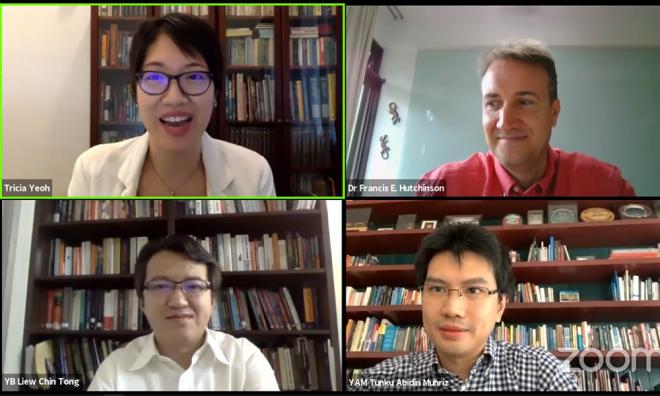
Decentralising resource allocation would be a move that would strengthen Malaysian democracy in the currently charged political atmosphere said Ideas fellow Tricia Yeoh in a webinar entitled "The Political Economy of Federal-State Relations today".
The webinar which was hosted by Ideas, the Institute for Democracy and Economic Affairs, looked at how the federal government has excessive power in terms of the resource allocation and distribution to the periphery, thus creating a relationship imbalance.
“Federal-state relations have been important in recent months as the country faces a political crisis, with a number of (state) governments changing hands and tensions rising,” said Yeoh.
She called for greater-fundraising autonomy and flexibility for state governments so that they don’t have to depend on the federal administration.
“The distribution of constituency development funds equally, regardless of whether an MP or state representative is part of the government or opposition would make a big difference,” said Yeoh who said that a bill to guarantee this fair distribution would be a positive step.
Yeoh also touted that the independence of state governments to take financial loans for development without having to obtain the approval of federal authorities would be a positive move.
“Currently we have the National Finance Council (NFC) as one of the available avenues for state chief ministers to negotiate for such development grants. Chaired by the prime minister, members include other federal ministers and a representative from each state. This means that the federal government dominates the NFC and therefore is hugely influential in determining the disbursement of conditional grants,” she said.
Yeoh said that in policies that developed over time, the federal government has strategically determined resource allocation through a number of means including through party-centred state administrations, administrative encroachment for greater political control, constitutional and legal requirements and by use of the politico-bureaucratic complex.
“Most states in Malaysia had already set up their state economic development corporations (SEDCs), beginning with Selangor in 1964, with the objective of promoting economic growth to achieve social and economic transformation of society at the state level.
But administrative instruments used to control SEDCs from the centre were also used, such as bringing the coordination of SEDCs under the direct control of a federal committee for coordination of SEDCs in 1969 and then later the Ministry of Public Enterprises (1976) and the Ministry of Entrepreneur Development (1990), by which time control encompassed strategic, operational, financial and personnel matters,” she said.
Yeoh also called for an end to the duplication of village development committees, a practice that came about when Barisan Nasional established the Federal Village Development and Safety Committees (Jawatankuasa Kemajuan dan Keselamatan Kampung Persekutuan or JKKKP) within states that it did not control.
Smaller city councils, more powerful state gov’ts
On the issue of strengthening local government, former deputy defence minister senator Liew Chin Tong said that while a lot of people talk about local council elections, they may not realise that the councils are already huge.
“The six big ones in Selangor have budgets of RM300-400 million each,” he said.
“This is the size of the state budgets of Kedah and Kelantan and much bigger than the budget of Perlis. I think we should have a smaller local council and a much bigger state government with more functions,” he said.
Liew backed Yeoh’s call for more state government funds saying it was imperative to find a way to share income resources with the federal government. “Part of the income tax should go back to the state government. At the moment the state government is assumed to depend on natural resources to survive, but the challenge is for the state not to depend solely on natural resources, which is detrimental to climate change,” he added.
Liew emphasised that federalism also had great value in holding a nation together.
“We need federalism because we need to manage differences in regions and identity, and federalism is important because we are not such a small country. Federalism provides room for differences to be managed.”
Saying that Malaysia needed to look at institutional changes, he called once again for a direct election to the Dewan Negara, as per the Australian model.
‘Public policy must be separated from political advancement’
Francis E Hutchinson, Senior Fellow at the ISEAS-Yusof Ishak Institute said the idea of a centralised government dominating the states is a relatively new one.
He cited the Johor state government in the 1890s which had an established civil service and was successfully running many schools and hospitals.
When we study the history of state and federal governments the focus is often on the conflict between two different political parties or coalitions, but actually, the development of these relationships mirror the development of Umno, which he said, grew from organic state-based organisations into a highly centralised power structure.
Ideas founding president Tunku Zain Al-'Abidin Tuanku Muhriz acknowledged that one of the problems of a well-meaning academic discussion is that political realities might come into direct conflict with public policy recommendations intended to improve systems of governance.
“Public policy recommendations, no matter how sensible, can, unfortunately, in a highly charged atmosphere regrettably be interpreted as partisan attempts to interfere and reduce or increase the power of certain political actors,” he said.
“This is an underdeveloped attitude towards public policymaking, one that perceives every potential public policy change from the standard point of one’s own political advancement,” he added, citing the need to educate the public and the political class.
“The more we reduce material rewards for jumping ship, the more stable our politics and policies may become,” said Tunku Zain who also said that centralised rule was not necessarily a part of Malaya’s administrative heritage.
He highlighted the decentralised governmental system that evolved in his state of Negeri Sembilan as one with checks and balances. - Mkini


No comments:
Post a Comment
Note: Only a member of this blog may post a comment.